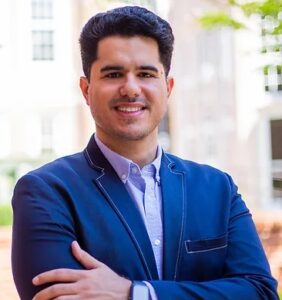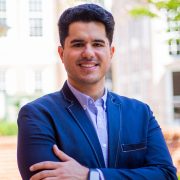Research Spotlight: Seyedahmad Rahimi
Q & A with Seyedahmad Rahimi, Ph.D., Assistant Professor in the School of Teaching and Learning
What basic questions does your research seek to answer?
My research aims to answer questions such as “how can we assess and enhance hard-to-measure constructs such as creativity at scale using technology-rich environments (e.g., digital games)?” or “what aspects of technology-rich environments can foster or hinder learning?” or “how can we embed learning content in digital games without sacrificing the fun to enhance students’ interest, engagement, and learning?” The list could go on. In general, my research interest is at the intersection of learning sciences, learning analytics, instructional design and technologies, psychometrics, and computer sciences. Specifically, my research focuses on assessing and fostering students’ 21st-century skills (focusing on creativity) and STEM-related knowledge acquisition (focusing on physics understanding). Toward that end, I design, develop, and evaluate immersive learning environments (e.g., educational games) equipped with stealth assessment and educational data mining and learning analytics models. These learning environments can diagnostically assess students’ various competency levels, predict different outcomes, and act accordingly in real-time (e.g., adapt the game challenges to students’ level of competency or support students’ learning by triggering the appropriate learning supports). I am also actively researching various aspects of educational games (e.g., game mechanics, game difficulty, cognitive and affective supports, dashboard design, and incentive systems) and how they affect students’ motivation, performance, and learning.
What makes your work interesting?
When I think about my research, I see the following keywords in a cloud above my head: stealth assessment, validity, reliability, fairness, equity, games, technology, learning analytics, machine learning, improvement, learning, creativity, and STEM-related knowledge. I think the combination of these concepts makes my research interesting. I can categorize these keywords into three groups: (1) methods: stealth assessment, validity, reliability, fairness, equity, learning analytics, (2) tools: games, machine learning, technology, and (3) outcomes: creativity, learning, improving, STEM-related knowledge. Using new methods to develop tools (e.g., games) that can accurately assess and enhance people’s critical skills in life, such as creativity and STEM-related knowledge, makes my research interesting. When it comes to STEM-related knowledge acquisition, I am interested in helping the minority populations build interest in STEM-related topics which can help them in the future. For instance, in our previous studies (with my former advisor Dr. Valerie Shute), girls always had lower prior physics knowledge than boys. However, they had higher or equal posttest scores (after playing Physics Playground—an educational game) than boys—this is very interesting to me. When it comes to creativity (one of the essential skills moving human civilizations forward), I am interested in automatic and accurate ways of assessing creativity or creative potential. Most of the creativity assessments in the literature need human judgment, are time-consuming, costly, limited, and subjective. Using techniques such as stealth assessment and machine learning, I want to develop tools (e.g., video games) that can assess creativity without involving human judgment. These tools can then use the real-time diagnostic assessment to enhance people’s creativity as well. Creativity is not just reserved for a small group of people. We all can be creative. My goal is to create research-based tools available at scale to help more people become creative with practice—this is very interesting to me, which keeps me up at night.
What are you currently working on?
As a fresh assistant professor, I am currently setting up my research lab, Game-based Assessment & Measurement in Education Lab (GAME Lab), at the Institute for Advanced Learning Technologies (IALT) at UF. Read more →






